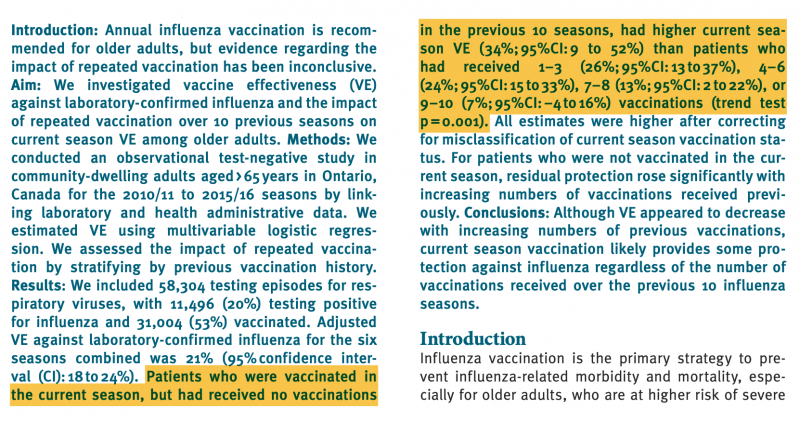impf-info.de
Nachdem Covid19 aus medizinischer Sicht "durch" ist, hier jetzt also wieder das Thema Impfen in ganzer Breite...
Influenza-Impfung: Wirksamkeit bei Älteren bei jährlicher Impfung noch schlechter als ohnehin schon...
Eine kanadische Studie (Beobachtungsstudie, Test-Negativ-Design, N=58.000) verglich die Wirksamkeit der Influenza-Impfung (VE) Älterer bei Menschen mit regelmäßiger Influenza-Impfung (wie allgemein empfohlen) und solchen mit nur einmaliger Influenza-Impfung während der letzten 10 Jahre:
Je mehr Impfungen die Teilnehmer in den vergangenen 10 Jahren erhalten hatten, desto schlechter war die Schutzwirkung der Impfung in der aktuellen Saison. (Man beachte die ohnehin katastrophal schlechte VE...)

Eurosurveillance | The impact of repeated vaccination using 10-year vaccination history on protection against influenza in older adults: a test-negative design study across the 2010/11 to 2015/16 influenza seasons in Ontario, Canada
Introduction Annual influenza vaccination is recommended for older adults, but evidence regarding the impact of repeated vaccination has been inconclusive. Aim We investigated vaccine effectiveness (VE) against laboratory-confirmed influenza and the impact of repeated vaccination over 10 previous seasons on current season VE among older adults. Methods We conducted an observational test-negative study in community-dwelling adults aged > 65 years in Ontario, Canada for the 2010/11 to 2015/16 seasons by linking laboratory and health administrative data. We estimated VE using multivariable logistic regression. We assessed the impact of repeated vaccination by stratifying by previous vaccination history. Results We included 58,304 testing episodes for respiratory viruses, with 11,496 (20%) testing positive for influenza and 31,004 (53%) vaccinated. Adjusted VE against laboratory-confirmed influenza for the six seasons combined was 21% (95% confidence interval (CI): 18 to 24%). Patients who were vaccinated in the current season, but had received no vaccinations in the previous 10 seasons, had higher current season VE (34%; 95%CI: 9 to 52%) than patients who had received 1–3 (26%; 95%CI: 13 to 37%), 4–6 (24%; 95%CI: 15 to 33%), 7–8 (13%; 95%CI: 2 to 22%), or 9–10 (7%; 95%CI: −4 to 16%) vaccinations (trend test p = 0.001). All estimates were higher after correcting for misclassification of current season vaccination status. For patients who were not vaccinated in the current season, residual protection rose significantly with increasing numbers of vaccinations received previously. Conclusions Although VE appeared to decrease with increasing numbers of previous vaccinations, current season vaccination likely provides some protection against influenza regardless of the number of vaccinations received over the previous 10 influenza seasons.
By accepting you will be accessing a service provided by a third-party external to https://www.impf-info.de/

